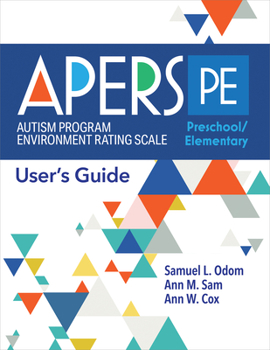Autism Program Environment Rating Scale - Preschool/Elementary (APERS-PE): User's Guide
How well does your educational program support learning, development, and participation for children on the autism spectrum? Find out with the APERS-PE, an in-depth assessment that evaluates the quality of educational programs for preschool and elementary students with autism. Filling the need for a reliable tool focused specifically on the unique learning needs of autistic children, the APERS-PE draws on observations, interviews, and reviews of student records to yield ratings of 10 key domains that make up overall program quality. Program leaders will use this invaluable snapshot to document their program's strengths and make a data-informed plan to address areas for improvement.
WHY APERS-PE?
A tool you can trust. Valid and reliable, the APERS-PE was developed by top researchers in autism and autism program quality.No other tool like it. The APERS-PE is the only assessment of program quality for this student population.Measures what matters. The APERS-PE assesses program features that are most likely to influence the learning and behavior of autistic students.Clear and actionable results. Detailed scores and easy-to-read graphics of results help you pinpoint your program's strengths and take action to resolve challenges.Informs professional development. The assessment helps your program identify specific areas for professional growth and determine where teachers might need more training and support.Provides proof of quality. APERS-PE data is a powerful way to demonstrate the quality of your program to decision makers and the families of your students.Great for all classroom types. The APERS-PE is equally useful for inclusive classrooms, self-contained classrooms for children with autism, and programs that combine elements of both.HOW IT WORKS
The APERS-PE contains 62 assessment items organized in 10 domains critical to program quality:
Learning EnvironmentsPositive Learning ClimateAssessment and IEP DevelopmentCurriculum and InstructionCommunicationSocial CompetencePersonal Independence and CompetenceInterfering BehaviorFamily InvolvementTeamingTo complete the assessment, a trained APERS rater--such as an autism specialist or a school psychologist--visits the program. The rater reviews student records for two to three focal students with autism, interviews school personnel and parents of the focal students, and observes the students during their school day, taking notes throughout the process. Then the rater completes an electronic scoring tool, which automatically generates item scores, overall program scores, scores for each domain (and dimensions within the domains), and graphs that provide a visual snapshot of the program. The rater writes up a report and shares results with school personnel for use in quality improvement.
Also included is the optional APERS-PE Self-Assessment, a shorter, faster assessment used by teachers and other service providers to guide them in program improvement plans. It can also be used as part of performance reviews and as a tool for communicating with families about program features.
Training recommended: Training is strongly recommended for all APERS-PE raters. APERS-PE training is provided through Frank Porter Graham Child Development Institute (FPG) at the University of North Carolina at Chapel Hill.





